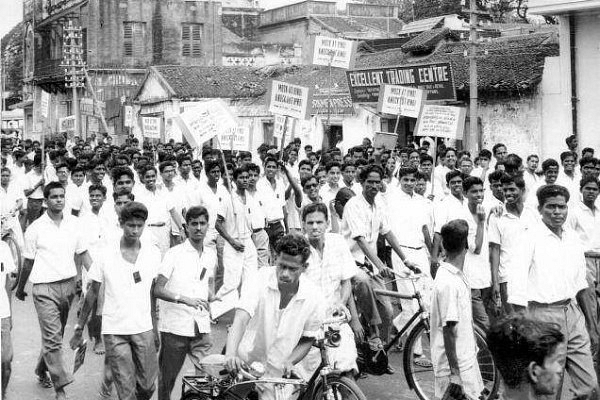From the archives
From The Archives: DMK And The Language Order
- Mysindia writes about the DMK’s anti-Hindi agitations in the 13 August 1960 edition of Swarajya.

People taking part in anti-Hindi agitations in Madras.
The Madras and central governments have been agitated at the prospect of a black flag demonstration organised by Dravida Munnetra Kazhagam (DMK) when the President visits Madras next week for Republic Day.
The DMK has chosen to exploit an important grievance: the Hindi policy in general, and President’s controversial order in particular. Accordingly, the Home Minister and the Madras Finance Minister have made statements assuring the public that the order does not bear the interpretation put upon it, that it is entirely in line with the Prime Minister’s statement last year.
Unfortunately, there is a good reason to doubt these reassurances. The day it was issued, the order aroused suspicion, and it has been criticised ever since. In fact, it has revived the anti-Hindi agitation, which the Prime Minister’s statement had deflated. Would it not be best, then to withdraw the offending order and replace it by one in which the doubter’s criticisms have been met?
The feeling is gathering strength in all non-Hindi areas, and especially in the southern states, that the President’s declaration requires definite clarification. In a very reasoned and logical statement on the matter, member of Parliament Dr Krishnaswamy analysed the President’s declaration in great detail and pointed out where exactly it fails to live up to the assurances of the Prime Minister. Irrespective of their political tags, all must agree with Dr Krishnaswamy’s considered view that the Presidential statement does go behind the Prime Minister’s repeated assurances.
It is no wonder, therefore, that the DMK in Madras has decided to launch a vigorous protest, seeking modification to the President’s declaration. It so happens that a party which is notorious for its extremely narrow outlook and parochial tendencies has now adopted, on this subject of English and Hindi, an attitude which reflects the feeling of the entire mass of people in all four south Indian states. It is, therefore, likely that a good case may be defeated by wrong patronage.
C Rajagopalachari (Rajaji) has pointed out in no ambiguous terms, in the Tamil weekly Kalki, the dangers of the present situation. There is not the slightest doubt that the assurances given by the Prime Minister have been given the go-by in the President’s carefully-designed declaration. Public feeling all over Mysore state is definitely in line with the apprehensions voiced by the DMK. But public feeling in this state is notorious non-vocal on vital matters, and there is a danger that the case may go by default on this vital subject of the future of English and Hindi.
There is, therefore, the urgent need for those who would work in the public interest in the Kannada region to make their own stand known in an emphatic manner. It is too much to expect Congressmen in this state – 98 per cent of whom do not even know the Hindi alphabet but all 100 per cent of whom are Hindi-enthusiasts (!) – to do anything which would ruffle the feathers of the high command in far-away Delhi.
This article was authored by Mysindia and appeared in the 13 August 1960 issue of Swarajya.
Introducing ElectionsHQ + 50 Ground Reports Project
The 2024 elections might seem easy to guess, but there are some important questions that shouldn't be missed.
Do freebies still sway voters? Do people prioritise infrastructure when voting? How will Punjab vote?
The answers to these questions provide great insights into where we, as a country, are headed in the years to come.
Swarajya is starting a project with an aim to do 50 solid ground stories and a smart commentary service on WhatsApp, a one-of-a-kind. We'd love your support during this election season.
Click below to contribute.
Latest